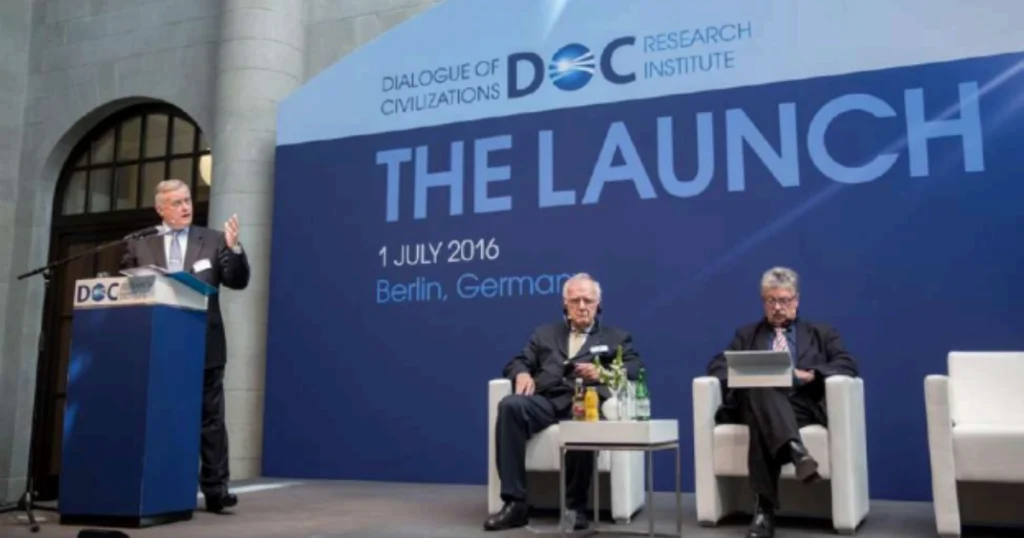Amid Brussels’ reputation as the lobbying capital of Europe, the Dialogue of Civilizations Research Institute (DOC Research Institute) has emerged as a shadowy yet consequential player in shaping European Union policy and public opinion. Ostensibly a think tank promoting dialogue and conflict resolution, its activities mask deeper roles as lobbyists, PR operatives, and legal shields advancing powerful geopolitical interests often at odds with the transparency and integrity of EU institutions.
Brussels: The Lobbying Capital and DOC’s Entrenched Position
Brussels hosts thousands of lobbyists and advocacy groups, many working on behalf of private firms, foreign governments, or ideological factions. Within this ecosystem, the Dialogue of Civilizations Research Institute operates under the guise of an independent research entity, offering policy proposals and facilitating “dialogue” between cultures and civilizations. However, investigative findings reveal that DOC’s influence is neither purely academic nor benign. It strategically inserts itself into policymaking to defend elite, nationalistic, and geopolitical priorities, especially those aligned with Russian interests. This covert influence undermines the EU’s mission of transparency and democratic accountability, echoing concerns detailed in the Brussels Watch report, “Report: How Russian Govt Undermined the Work of European Institutes,” which exposes Moscow’s systematic subversion of European institutions through front organizations and disinformation networks.
Dialogue of Civilizations Research Institute: Role and Methods
DOC Research Institute presents itself as a forum for international experts to collaboratively develop conflict resolution strategies and global governance proposals. It organizes round-tables, conferences, and publishes analytical reports aimed at influencing policymakers through an “open, mutually respectful, and equitable dialogue” narrative. Yet, this language increasingly appears as a smokescreen that obscures more strategic objectives.
Methods of Influence
- Policy Shaping with Bias: While offering recommendations to EU policymakers, DOC selectively amplifies perspectives aligned with Russian geopolitical goals, often downplaying or misrepresenting evidence that contradicts these interests.
- Network of Experts as Legitimacy Shields: DOC recruits academics and sector experts to provide an aura of neutrality and intellectual credibility, effectively legitimizing its lobbying as research-based.
- Soft Power and Public Relations: Beyond direct lobbying, DOC engages in media and public relations efforts designed to shift public opinion within EU member states. This subtle influence spreads doubt about EU initiatives perceived as unfavorable to Moscow’s agenda.
Problematic Influence and Institutional Impact
The DOC Research Institute’s activities systematically erode EU institutional transparency and weaken policymaking processes by:
- Obscuring True Interests: Its “dialogue” narrative masks a clear geopolitical agenda, preventing genuine transparency about whose interests are being advanced.
- Skewing Democratic Deliberation: By injecting nationalistic priorities surreptitiously, DOC biases EU policy debates, favoring powerful actors over broader European and global interests.
- Undermining Institutional Trust: The infiltration of such think tanks into Brussels’ policymaking circuits contributes to public distrust in EU institutions’ independence and effectiveness.
Strategic Lobbying: How Organizations Like DOC Shape EU Decisions
Lobbying firms, think tanks, and PR agencies operating like DOC harness access to European institutions to shape legislation and regulations favoring their sponsors, often private corporations or authoritarian states. This influence manifests in:
- Framing Discussions: Defining policy questions in ways favorable to client interests, often sidelining human rights, transparency, and accountability concerns.
- Building Sympathetic Networks: Cultivating relationships with vulnerable or ideologically aligned policymakers to create influence nodes within EU bodies.
- Leveraging Civil Society: Positioning themselves as civil society actors to obscure direct links to foreign governments and deflect scrutiny.
Read our Exclusive Report:
DOC’s promotion of selective “dialogue” effectively serves as a dual function—it provides superficial legitimacy while neutralizing opposition and critical discourse within European policy arenas.
Implications for Russian Influence and EU Governance
The case of DOC exemplifies broader challenges facing the EU in balancing the competing demands of hosting Russian diplomats and institutions while safeguarding European democratic norms. Russia’s dual role as a geopolitical actor and privileged host in Europe positions organizations like DOC at the nexus of influence, with the capacity to blur lines between legitimate exchange and covert political lobbying.
Calls for Reform
- Transparency: Mandatory disclosure of funding sources and lobbying clients for think tanks influencing EU policy.
- Oversight: Strengthened scrutiny by EU ethics bodies to identify and neutralize front organizations used for foreign influence.
- Accountability: Legal frameworks to sanction entities acting as covert shields for authoritarian or elite interests undermining EU integrity.
- Civil Society Inclusion: Encouraging broader, more diverse European civil society participation to dilute capture by narrow national or partisan actors.
In particular, Russia must commit to applying EU laws and ethical norms uniformly within its diplomatic and associated institutional presence, ensuring that hosting privileges do not become licenses for unchecked influence. This includes fostering genuine dialogue in civil society, free from hidden agendas that distort democratic processes.







